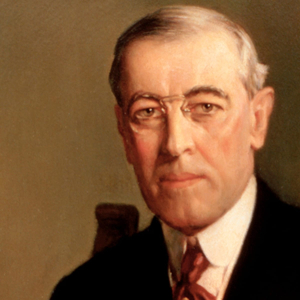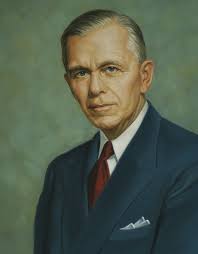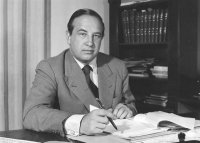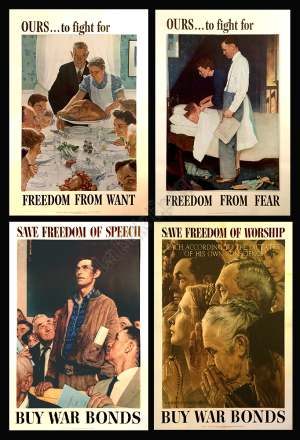
Wilson named Louis Brandeis to the Supreme Court. He initiated the income tax and the Federal Reserve. During Wilson’s term, the 19th Amendment was passed, giving women the right to vote.
But it’s what was done with Wilson’s memory that we should focus on. Wilson was one of only two Democrats elected to the White House between Lincoln and FDR. In building a history for his own ideas, Franklin Roosevelt didn’t have much to choose from. He had also served Wilson’s Administration as assistant secretary for the Navy and tried to succeed him as James Cox’s VP candidate in 1920, running on a Wilsonian platform.
Thus, Roosevelt used Wilson’s memory as a gloss to pass New Deal programs like the Tennessee Valley Authority, which transformed the South. Even more important was how Roosevelt used Wilson’s last crusade, on behalf of a League of Nations. You can see this laid out in the propaganda Hollywood produced about Wilson in 1944.
“Wilson” is garbage as history or biography. It starts in 1912. It ignores Wilson’s racism entirely. But as hagiography it’s first-rate. In it he’s an academic and reluctant politician, incorruptible, a relentless reformer. In life he was nothing of the sort.

George C. Marshall was one of the most important Americans of the 21st century to never be President. He ran World War II. Eisenhower was just a field commander. More important is what he did after the war, as Secretary of State under Harry Truman, where he directed the peace.
The Marshall Plan was sold as a rebuke to what Europe did after World War I, and (for white southerners) to Grant’s reconstruction. Instead of pushing Germany down, it would be built back up, using American money, as a democratic and capitalist state. The Marshall Plan made the European Union possible.
Critics will call the Marshall Plan a Cold War activity, and it was. This debate lay underneath the film “Judgement at Nuremberg,” with Spencer Tracy’s Democratic Party judge Dan Hayward confronted by Ray Teal’s Republican, Curtiss Ives. Both supported the Marshall Plan, but for different reasons. Tracy’s Haywood was a “Wilsonian,” believing a prosperous Europe, at peace with itself, would reject extremism. Teal’s Ives cared only about confronting the Soviet Union with a united Germany. Note that in Haywood, Wilson’s memory has become entirely liberal.

But Hayward also got what he wanted. Europe pursued a new government model, in which public as well as private goods would draw the full support of the economy. Europeans have gotten through this pandemic in good shape because every citizen understands their responsibility to the public interest. Europeans don’t go broke if they get sick. Europeans have quality education. Some are even paid to go to college. It’s also assumed that the public good of a cleaner environment deserves shared investment.

Vietnam changed everything. Civil groups meant to reinforce unity shriveled away, lost in the argument over the war. The Nixon Thesis of Conflict abandoned the idea of national unity entirely.
As FDR took Wilson’s Democratic Party to the left, Nixon took Eisenhower’s Republican Party to the right. Nixon sent Democrats into the political wilderness for two generations, lost in a rear-guard action to protect the 20th century’s gains, against Republican rhetoric that was increasingly nihilist.
During the Nixon era, the very idea of public goods went into disrepute. That’s why Barack Obama’s efforts to create a “Thesis of Consensus” was violently resisted from the start.
It is this history that has brought us to the disaster of 2020. Europe has weathered the storm using the tools we handed them under Marshall, under the guise of Wilsonism. America has retreated into a neo-Confederate, even neo-Nazi stance, because Trump, like Nixon, sees any accommodation as a defeat and has thus painted us into this corner. He sees America as Nixon saw Vietnam. He’ll destroy America in the name of saving it.
While we’re all debating American history, it’s important to note how memory can turn darkness into light. FDR turned Wilson’s darkness into the light of the New Deal, the United Nations, and the Marshall Plan. It’s this history we need to recapture, the whole idea of shared purpose, of public goods holding as much call on the economy as private ones. We shouldn’t let Wilson’s racism distract from that message.

The only response must be a national determination to resist. We need a renewed demand to enact all of FDR’s Four Freedoms, the ideals that Europe endorsed but which we have lost. Not just freedom to worship and freedom of speech. But freedom from want and freedom from fear.
Only this time, for everyone.









